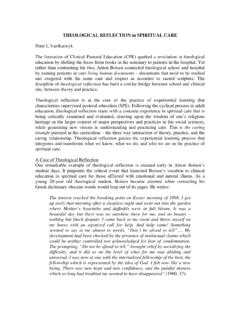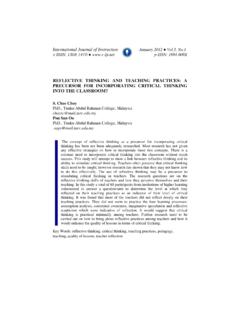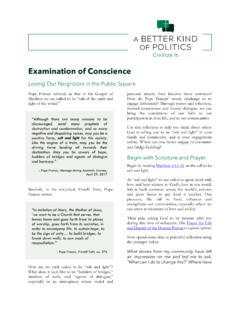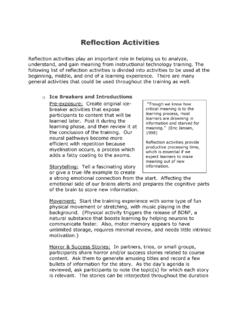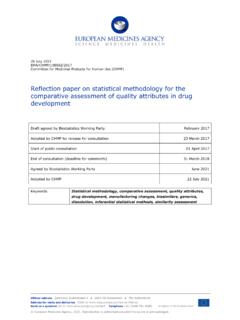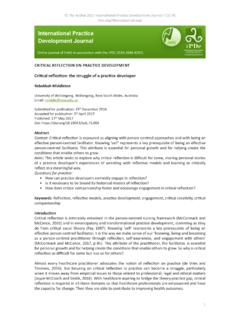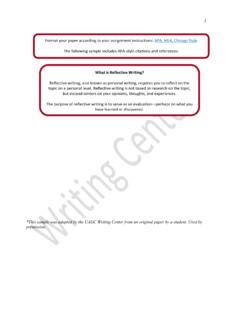Transcription of Ethical Judgment - University of Notre Dame
1 Ethical JudgmentEthical JudgmentEthical JudgmentEthical JudgmentEthical JudgmentActivity Booklet 2 Nurturing Character in the Middle School ClassroombyTonia BockCommunity Voices and Character EducationPartnership ProjectDepartment of Children, Families and Learning& the University of MinnesotaUniversity of Minnesota Design Team AuthorsDarcia NarvaezwithLeilani Endicott Tonia Bock Christyan MitchellSensitivitySensitivitySensitivit ySensitivitySensitivityJudgmentMotivatio nAction Copyright Darcia Narvaez, 2001 This material has been developed under the auspices of grant # R215V980001 from the Depart-ment of Education Office of Educational Research and Improvement. The copyright is held by DarciaNarvaez. The materials are under development and we anticipate changes in them. These materials maybe duplicated only with expressed permission. This prohibits third party duplication which would be aviolation of copyright.
2 We are happy to share these materials with many people but we are the oneswho must approve copies. Inquiries should be sent to Darcia Narvaez, Department of Psychology, University of Notre Dame, Notre Dame, IN 46556; 2001 Copyright, Darcia NarvaezEthical Judgment OverviewEthical JudgmentEthical JudgmentEthical JudgmentEthical JudgmentEthical JudgmentACTIVITY BOOKLET 2 ContentsTopicPage NumberOrganization of Booklet 4 Ethical Judgment Overview 6EJ-1: Understanding Ethical Problems 13EJ-2: Using Codes and Identifying Judgment Criteria 28EJ-3: Developing General Reasoning Skills 38EJ-4: Developing Ethical Reasoning Skills 55EJ-5: Reflecting on the Process And Outcome 69EJ-6: Planning to Implement Decisions 77EJ-7.
3 Developing Optimism 88 Ethical Judgment Appendix 100 Includes Links of Judgment skills to Graduation Standards and Search Assets,Lesson Planning Worksheets, Special Activities and Resources for Ethical Judgment4 2001 Copyright, Darcia NarvaezEthical Judgment OverviewOrganization of Ethical Judgment BookletOverview PagesEthical Action skills and subskillsSkill Sections (7 skill sections in all--the meat of the booklet)Skill Overview (see sample page below)Subskills (see samples pages on p. 3)ActivitiesAssessment hintsClimate suggestionsAppendixGuide for Lesson Planning Linking to the Community WorksheetRubric ExamplesSpecial ActivitiesResourcesLinking EA Skills to Graduation StandardsLinking EA Skills to Search Institute AssetsReferencesWHATP erseverance enables individuals to completeactions that are important to them and it, many Ethical actions would fail at thesight of the first obstacle or is important for the completion of anethical action.
4 Children can be successfullyinstructed to talk to themselves about not doingsomething, and instructed on how to distractthemselves from unwanted behavior. A form of self-talk to complete a task can be a useful technique tohelp one find the ego strength to complete anethical action at any STUDENTS FIRST LEARNP lanning skills, particularly strategic thinking andgoal setting skills (EJ6)SUBSKILLS OVERVIEW Self-control Delayed gratification Impulse Control Overcoming obstacles and discouragement Pushing oneselfDeveloping PerseveranceDeveloping PerseveranceDeveloping PerseveranceDeveloping PerseveranceDeveloping PerseveranceEthicalEthicalEthicalEthical EthicalAction 6 Action 6 Action 6 Action 6 Action 6 This skill addresses the Minnesota Comprehensive Goals:Productive Group Participant, Self-directed Learner, Responsible CitizenEA-6 Developing Perseverance: OverviewSkill Overview PageSkill Overview PageSkill Overview PageSkill Overview PageSkill Overview PageSkill TitleSkill TitleSkill TitleSkill TitleSkill TitleMinnesota ComprehensiveGoals for SkillWHAT the skill isWHY the skillis importantSUBSKILLS listSkill Name: Subskill NameSide Header5 2001 Copyright, Darcia NarvaezEthical Judgment OverviewEA-6 Developing Perseverance: Pushing OneselfSubskillSubskillSubskillSubskillS ubskill 3: PUSHING ONESELF 3: PUSHING ONESELF 3: PUSHING ONESELF 3: PUSHING ONESELF 3: PUSHING ONESELFI deas for Developing SkillsLevel 1: Immersion in Examples and OpportunitiesAttend to the big picture, Learn to recognize basic patternsStudy self-efficacy.
5 Discuss how, for a particular field, small successes give aperson confidence to keep trying and try harder things. Find examples inliterature, television and movies, or in a particular subject 2: Attention to Facts and SkillsFocus on detail and prototypical examples, Build knowledgeSelf-talk. Find examples of and discuss how to cheerlead for yourself indifferent situations. What behaviors help you do your best and reach excellence?(1) Students discuss self-talk and behaviors that help one persevere. (2) Studentsinterview older students or adults about general behaviors. (3) Students interviewadults in roles they admire or strive for in a particular 3: Practice ProceduresSet goals, Plan steps of problem solving, Practice skillsExamples of pushing oneself in helping others. Students interview elders abouttheir personal experiences of (1) how they persevered in trying to help others;(2) how they persevered in working towards a goal that helped 4: Integrate Knowledge and ProceduresExecute Plans, Solve ProblemsSelf-help.
6 Have students practice ways to coach oneself to reach excellence inskills like these for a particular subject area: Persistence in mental and physicaltasks; Keep trying to solve a problem if it s hard; Completing tasks withoutencouragement from Reeves (who played Superman in the movies) had a ski accidentthat left him a quadriplegic. He could have given up in life and stayed homequietly. But he became a spokesman for those with spinal injuries, traveling tospeak about the importance of research in spinal OneselfUse multiple-choice, true-false,short answer, or essay tests toassess student s knowledge ofstrategies to push students write reports,based on observations orinterviews, of what theylearned about pushing you need to know for success in attitudes affect what you believe/think about affects your you have some control over your learning anything requires commitment (decision to put yourenergies into a task)EA-6 Developing Perseverance.
7 ClimateCreate a Climateto Develop PerseveranceRegularly discuss the importance of finishing a task, as a group or point out what would happen if people did not persevere until a job was done ( ,the highway, a bridge , your house, your car) and how it would affect people around the importance of persevering in meeting your responsibilities to Student Self MonitoringDeveloping Perseverance Self-control I wait to reward myself until I ve finished my work. I don t wait until the last minute to do my work. I lose control when I am angry. (NOT) I control my feelings of anger. I resist my impulses to disobey Activities PageSubskill Activities PageSubskill Activities PageSubskill Activities PageSubskill Activities PageSkill Climate PageSkill Climate PageSkill Climate PageSkill Climate PageSkill Climate PageSubskill NAMES ubskill NAMES ubskill NAMES ubskill NAMES ubskill NAMEE xpertExpertExpertExpertExpert ExampleSubskill Activitiesby Level of Expertise(4 levels total,usually spans 2-4 pagesper subskill)Skill Name.
8 Subskill NameSide HeaderHints forAssessmentSuggestions forCreating a ClimateCreating a ClimateCreating a ClimateCreating a ClimateCreating a Climateto Develop SkillSample Self-MonitoringQuestions for StudentSelections to Post in the ClassroomSelections to Post in the ClassroomSelections to Post in the ClassroomSelections to Post in the ClassroomSelections to Post in the Classroomfor Developing Skill6 2001 Copyright, Darcia NarvaezEthical Judgment OverviewEthical Processes & Skillswith Ethical Judgment SubskillsActivity Booklet 1: Ethical SENSITIVITYA ctivity Booklet 1: Ethical SENSITIVITYA ctivity Booklet 1: Ethical SENSITIVITYA ctivity Booklet 1: Ethical SENSITIVITYA ctivity Booklet 1: Ethical SENSITIVITYES-1 Reading and Expressing EmotionES-2 Caring by Connecting to OthersES-3 Working with Group and IndividualDiffeencesES-4 Taking the Perspectives of OthersES-5 Controlling Social BiasES-6 Generating Optional ActionsES-7 Identifying the Consequences of Actionsand OptionsActivity Booklet 3: Ethical MOTIVATIONA ctivity Booklet 3: Ethical MOTIVATIONA ctivity Booklet 3: Ethical MOTIVATIONA ctivity Booklet 3: Ethical MOTIVATIONA ctivity Booklet 3: Ethical MOTIVATIONEM-1 Respecting OthersEM-2 Developing ConscienceEM-3 Acting ResponsiblyEM-4 Helping OthersEM-5 Making Peace and CooperatingEM-6 Valuing Social StructuresEM-7 Developing Ethical Identity And IntegrityActivity Booklet 4: Ethical ACTIONA ctivity Booklet 4: Ethical ACTIONA ctivity Booklet 4: Ethical ACTIONA ctivity Booklet 4: Ethical ACTIONA ctivity Booklet 4.
9 Ethical ACTIONEA-1 Communicating WellEA-2 Resolving Conflicts and ProblemsEA-3 Identifying Needs and Acting AssertivelyEA-4 Taking Initiative as a LeaderEA-5 Developing CourageEA-6 Developing PerseveranceEA-7 Working HardActivity Booklet 2: Ethical JUDGMENTA ctivity Booklet 2: Ethical JUDGMENTA ctivity Booklet 2: Ethical JUDGMENTA ctivity Booklet 2: Ethical JUDGMENTA ctivity Booklet 2: Ethical JUDGMENTEJ-1 Understanding Ethical ProblemsGathering informationCategorizing problem typesAnalyzing Ethical problemsEJ-2 Using Codes and Identifying JudgmentCriteriaCharacterizing codesDiscerning code applicationJudging code validityEJ-3 Developing General Reasoning SkillsReasoning objectivelyUsing sound reasoningAvoiding reasoning pitfallsEJ-4 Developing Ethical Reasoning SkillsJudging perspectivesReasoning about standards and idealsReasoning about outcomesEJ-5 Reflecting on the Process And OutcomeMonitoring one s reasoningReasoning about means and endsEJ-6 Planning to Implement DecisionsThinking strategicallyImplementing successfullyDetermining resource useEJ-7 Developing OptimismApplying positive thinking skillsModifying affect in thinkingExplaining causes7 2001 Copyright.
10 Darcia NarvaezEthical Judgment OverviewEthical JudgmentEthical JudgmentEthical JudgmentEthical JudgmentEthical JudgmentEthical Judgment involves reasoning about the possible actions in the situation and judging which action is most Ethical . This component is influenced by Ethical Sensitivity, Motivation, and of SkillsEJ-1: UNDERSTANDING Ethical PROBLEMSTo fully understand a problem, regardless of the subject area or domain, a person must accurately definethe problem and understand its structure. In defining the problem, the problem solver determines whatinformation is critical and what is unimportant in deriving a solution. To understand a problem s struc-ture, the problem solver organizes critical information to generate options and strategies. All this is donein the context of knowing why s/he is creating a solution in the first : USING CODES AND IDENTIFYING Judgment CRITERIAC odes are what we know and use to act respectfully and responsibly in different domains or contexts.
